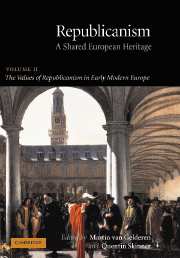Book contents
- Frontmatter
- Contents
- Contents of Volume I
- Acknowledgments
- Introduction
- Part I Republicanism and Political Values
- 1 Classical Liberty and the Coming of the English Civil War
- 2 Empire and Liberty: A Republican Dilemma
- 3 Republicanism and Toleration
- 4 The Mechanisation of Virtue: Republican Rituals in Italian Political Thought in the Sixteenth and Seventeenth Centuries
- 5 From Virtue to Politeness
- 6 From Civism to Civility: D'Holbach's Critique of Republican Virtue
- Part II The Place of Women in the Republic
- Part III Republicanism and the Rise of Commerce
- Bibliography
- Contributors
- Index of Names of Persons
- Index of Subjects
6 - From Civism to Civility: D'Holbach's Critique of Republican Virtue
Published online by Cambridge University Press: 11 January 2010
- Frontmatter
- Contents
- Contents of Volume I
- Acknowledgments
- Introduction
- Part I Republicanism and Political Values
- 1 Classical Liberty and the Coming of the English Civil War
- 2 Empire and Liberty: A Republican Dilemma
- 3 Republicanism and Toleration
- 4 The Mechanisation of Virtue: Republican Rituals in Italian Political Thought in the Sixteenth and Seventeenth Centuries
- 5 From Virtue to Politeness
- 6 From Civism to Civility: D'Holbach's Critique of Republican Virtue
- Part II The Place of Women in the Republic
- Part III Republicanism and the Rise of Commerce
- Bibliography
- Contributors
- Index of Names of Persons
- Index of Subjects
Summary
Eighteenth-century French political theory is replete with paeans to the virtue of the ancients; numerous are the encomia on the cities of antiquity and particularly on the prodigious feats they were able to achieve in giving the world examples of virtue and liberty that no later epoch could equal. From the pen of Rousseau, of Mably, even of writers not as likely to be suspected of adoration of Sparta and republican enthusiasm – Helvétius for example – we find time and again the same astonishment when confronted with a body of austere and egalitarian legislation that obliged men to raise themselves above the common level and, in every case, to furnish examples of greatness, disinterestedness, independence and generosity which the modern age seemed incapable of imitating. On several occasions we find – in Montesquieu, among others – the idea that man seems to have shrunk, as it were, since that heroic age, to such an extent that what ancient writers and historians tell us about it seems mythical and barely credible: people's ability to sacrifice personal advantage to the common interest – the very definition of ancient virtue – seemed at any rate highly paradoxical and alien to modern minds.
The praise of ancient liberty was less universal because very early on – in any event well before Benjamin Constant's famous speech (Constant 1819) – doubts began to be expressed about its possible drawbacks, in particular about the subjugation of the individual, in his every action and even in his thoughts and most intimate activities, to what Constant was to call social authority.
- Type
- Chapter
- Information
- RepublicanismA Shared European Heritage, pp. 107 - 122Publisher: Cambridge University PressPrint publication year: 2002
- 2
- Cited by



